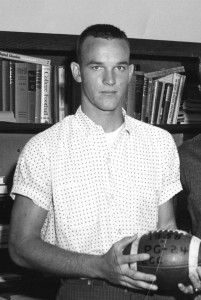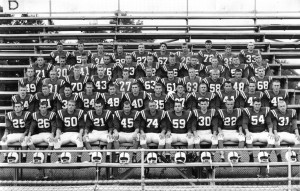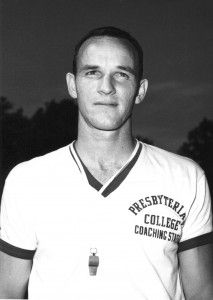Bob Waters, personification of the PC Spirit
October 2013
Presbyterian College has produced many star athletes during its 125+ year history and one of the finest is Bob Waters; however, his athleticism is far from being the most remarkable thing about him.

Bob Waters with 1958 ECU game ball, PC 24 – ECU 16
Robert Lee Waters, a native of Sylvania, Georgia, earned eleven athletic letters in three sports at Screven High School. Waters started college in 1956 at Stetson University in DeLand, Florida as a freshman quarterback, however, when Stetson eliminated its football program at the end of that season, Bob waters left Stetson after one semester. (Tribute to a Champion – The Bob Waters Legacy, Western Carolina Athletics website)
Waters transferred to Presbyterian College in 1957 to play under Coach Frank Jones and started in the quarterback position for the next three years. An outstanding student leader, “he compiled an excellent academic record while holding the positions of student body president and ROTC battalion executive officer.” (PC Department of Public Relations news release, 5/31/1966)
Waters had been selected for Who’s Who and Blue Key as well as participating in Pi Kappa Alpha fraternity and Block P, the college letterman’s club. Selected as an All-American quarterback in 1959, he led the Blue Hose team to a 9-1 record during the regular season, then to the Tangerine Bowl (later Citrus Bowl, now the Capital One Bowl) against Middle Tennessee State University in January 1960. An account of the bowl game can be accessed online in the college yearbook, the 1960 Pac Sac, page 144-45, which is hosted by the Internet Archive. After being chosen as the MVP of that game, which PC lost 21-12, Bob Waters was drafted by the San Francisco 49ers following his June graduation from Presbyterian College.

Tangerine Bowl Team, Fall 1959
According to the Los Angeles Times (5/31/1989), Waters “is remembered in California as one of the National Football League’s three original shotgun formation quarterbacks. Waters, in fact, threw the first touchdown pass ever from a shotgun formation. That was in November, 1960, when, in a 30-22 upset, the San Francisco 49ers beat the Baltimore Colts.” The Colts had won the two previous NFL championships.
Playing in San Francisco for several years, Waters returned to Presbyterian temporarily during the NFL’s off-season in 1962 to assist Coach Clyde Erhardt with spring football practice and track and field coaching.

Assistant Coach Bob Waters, Presbyterian College
In six seasons with the 49ers, Waters played offense and defense until he was sidelined with a knee injury. Upon leaving San Francisco in 1966, Waters completed work on a Masters degree in History from Georgia Southern University. Waters, who had met and married his wife, Sheri, in California, returned to Presbyterian as a full-time assistant coach that year, working with quarterbacks and pass offense under Coach Cally Gault. In 1968 he accepted an assistant coaching position at Stanford University (CA). After he was named head football coach at Western Carolina University in Cullowhee, North Carolina, Waters and his young family returned to the east coast in 1969. He spent the next twenty years coaching the Catamounts and serving as Director of Athletics.
“Prior to his arrival, WCU had posted only five winning football records in 20 seasons, while 13 of Waters’ 20 teams turned in winning ledgers.” He was named Southern Conference Coach of the year in 1983 after WCU was undefeated in conference play. “In 20 seasons at the helm of the football program, he guided the Catamounts to 116 victories, produced 13 All-Americans, 54 first-team All-Southern Conference selections and brought the University more positive publicity than could ever be measured in monetary terms.” (Tribute to a Champion, WCU Athletics website)
In 1984, Coach Waters was diagnosed with amyotrophic lateral sclerosis, often referred to as Lou Gehrig’s disease. Paying tribute to this courageous man on Bob Waters Day, November 27, 1986, during the Bronze Derby football classic at Presbyterian College, college president, Dr. Kenneth Orr, recognized Waters’ achievements as a player and coach saying, “even more we appreciate all that he contributes to the field of athletics as a gentleman of integrity and high sportsmanship. These attributes and his courage in the face of adversity make Bob Waters a man of special worth, whose example is an inspiration to others.” (Presbyterian College Public Relations press release, 1986)
In his remarks that day, Waters said of his family, “We have the PC Spirit.” (Presbyterian College Report, December, 1986, p.20)
After Waters’ six year battle against ALS, and upon his death in May 1989, Cally Gault said, “he set a great example long before his illness. The way he handled his life before and after his illness was an inspiration to all of us.” (Presbyterian College Report, Fall 1989)
Bob Waters’ funeral was held at Western Carolina on the playing field at E. J. Whitmire Stadium which had been named “Bob Waters Field” in 1988 in recognition of his service to the school.
His courage and perseverance in facing a diagnosis of ALS inspired Presbyterian College and the Scotsman Club in 1987 to establish the Bob Waters Award, honoring PC alumni in the athletic coaching profession who personify the values and qualities of excellence and integrity held dear to Presbyterian College. Bob Waters was a living example.
In looking through his file in the Archives, I noticed his response to a question on an Alumni form he filled out in June of 1984: “What was the most positive aspect of your PC Experience?” His response was simply: “Football.” While he is certainly remembered at PC and elsewhere for his skill as a football player and coach, he is remembered even more for his sportsmanship, his integrity, and his courage.
